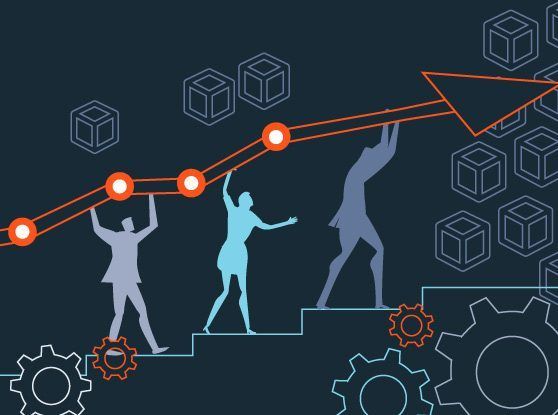The People Shake-Up: How 2020 is Transforming HR’s Role

There is no doubt this year is one for the history books. COVID-19 has redefined our social interactions, our workplaces, and our cities in general. In the workplace, teams have moved entirely to a virtual environment and the question remains how, if, and when they can safely return. This is not the only concern regarding the future of work. Questions around managing distributed teams, accommodations and compliance, talent acquisition, retention, and culture are all top of mind.
The shakeup to the workplace has put HR teams front and center as they help companies navigate the “new norm.”
Insight Partners sat down with several ScaleUp leaders in the companies we’ve invested in to discuss how they expect this year’s changes to impact their businesses and HR teams in the long term. Below is a summary of their observations:
1) Flexibility is here to stay, but it raises some new questions for HR leaders.
Many tech giants have already committed to transitioning to a fully remote workforce, and the question is whether this translates to ScaleUps. To Louis Jauvin, Head of People at Checkout in London, “the future of work is a hybrid of the online and offline worlds. With the prospect of rolling lockdowns, this is likely to be fluid for many ScaleUps.”
He is not alone. Some HR leaders have started to reexamine their leases, and some have already committed to downsizing their office space.
“We surveyed our employees so we could better understand how much space we would need moving forward. We are now allowing our employees to opt in to work from home 100% or a hybrid with 2+ days in the office.,” said Sandy Scholes, Chief People Officer at Flipp, based in Toronto.
While a hybrid or fully remote model represents upside opportunity for companies and employees such as less time wasted commuting, more family time and ability to recruit from other geographical locations, the increased flexibility has also raised a few concerns for HR leaders.
Some stressed that the new flexibility has tax implications as many employees look to relocate to lower cost areas or to be closer to family. This also impacts compensation policies. Other leaders noted their concerns with how the increased flexibility will impact culture and retention.
Scholes at Flipp continued, “So many organizations are going fully remote, so talent is no longer tied to a location. How will this impact our retention? Will our local talent be poached by big tech companies that are now recruiting globally?”
2) Enabling people leaders is a big priority.
As COVID-19 forced the workforce home, one big challenge has come to light: how to make sure people managers are set up for success in a remote setting.
Remote work, along with other stressors like increased workload, isolation, lack of daycare, and protests around racial inequality, increases the load that that employees are navigating this year – and puts the extra onus on leaders to manage effectively.
“Supporting managers through a crisis is something that still needs to be talked about,” noted Nurit Shiber, Chief People Officer at Sisense based in Tel Aviv and New York. “We will be seeing more burnout and we risk the retention of our managers in the long-term if we don’t address this. We need to make sure they have the tools to manage successfully – be it enabling leaders through the pandemic or preparing them for what may become our new normal.”
This speaks to why so many HR leaders have prioritized virtual leadership trainings, personalized coaching and online feedback to ensure leaders have the skills necessary to support a fully remote workforce.
Scholes at Flipp noted, “We have a lot of first-time leaders at Flipp, so we asked ourselves how do we upskill and enable our people leaders? That’s why we created a new virtual training and development program. We just rolled out the first module and plan to continue the program even after COVID – although it will likely be a hybrid of virtual and in-person.”
3) Mental health is in the spotlight.
While work from home typically affords employees more flexibility, during the pandemic, there has been less opportunity to disconnect.
“People are burning out a bit,” said Scholes at Flipp, “We’re doing a lot to try to help people turnoff but it’s still difficult.”
Many companies implemented new offerings to combat the added stress of our current climate. Some companies are giving employees more time off (e.g., Sisense implemented global monthly vacation days to allow all employees to disconnect without worrying about backlog) and others instituted daily check-ins with managers to support the mental health of their employees.
Jauvin noted, “At Checkout, we have acted quickly to support the mental health and wellbeing of employees through the launch of a wellbeing program – designed specifically for an increasingly remote global workforce.”
Some HR leaders even noted that they anticipate we will see new functions and jobs in HR that are dedicated to supporting employee wellness and encouraging employee engagement. Several companies have purchased corporate licenses to meditation apps, like Calm, as a way to help employees lower anxiety and manage stress.
Overall, concerns around mental health and how companies can do more for their people, are front and center, and this is a trend we expect to continue.
4) Caring is now at a premium.
The software industry is in a unique position. SaaS companies have weathered the economic storm better than other industries. This has allowed tech companies to focus on their people and implement more employee-centric policies.
The HR leaders we spoke to stressed that they expect to see a continued emphasis on empathy in the workplace.
“People want to see the soft side of leaders today and we need to make sure it is part of our leadership training,” said Jauvin at Checkout. This is true for both first-time and senior leaders. “We need to lead with compassion, clarity of thought and empathy,” continued Jauvin.
But even more so, it seems that purpose-driven leadership has truly become table stakes within SaaS. Employees don’t just expect empathy for themselves but for the world around them and all stakeholders in the community.
Take diversity, equity & inclusion (DE&I). With the protests around racial inequality and social injustice, diversity in the workplace – or the lack thereof – has become a central conversation.
“People are looking to their companies to have an active voice in the discussion and take action,” noted Shiber at Sisense.
In many ways, companies are taking on the tough conversations that, in the past, were deemed inappropriate for the workplace. The question remains how companies will maintain the focus and energy around these conversations and convert current empathy to real change.
“Companies in 2020 need to be more transparent,” said Jauvin. “At Checkout.com, we’ve established internal employee communities for people to bring their full selves to work. We believe these are crucial for showing action and nurturing values of care and compassion. D&I can’t just be a trend. We really need to invest in it to drive change.”
5) Prepare for uncertainty.
COVID-19 taught us that we cannot plan for the unexpected, but we can be agile in how we respond.
“The pandemic has accelerated the inevitable and challenged the status quo for many companies. Everything that we have seen come out of this year, will likely be embedded in 2021 and beyond,” said Jauvin at Checkout.
As far as long-term planning goes, many HR leaders do not think we should rush new policies. Because we are living in unprecedented times “this year cannot really be used as a benchmark –
we aren’t operating normally,” notes Janette Jankowski, SVP of Human Resources at Achieve3000 based in New Jersey. This creates a lot more ambiguity as companies plan for next year and years to come.
Companies will need to measure, observe, and adjust as needed to effectively navigate the “new norm,” as well as communicate clearly with employees to ensure they are brought along for the journey.
This past year has thrown all of us for a loop. As we look ahead to 2021, a lot is still unknown. However, despite all the uncertainty, one fact emerges clearly from this year: HR leaders have a big job on their hands.
While ScaleUps usually focus on talent acquisition and onboarding, this year’s questions around retention, employee productivity, and physical and mental health have caused companies to reflect on their corporate cultures, workforce composition, and company policies. There is no doubt 2020 has seen a people shake-up. We see HR leaders rising to the challenge.









